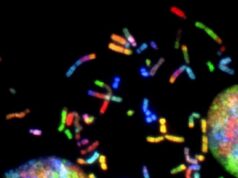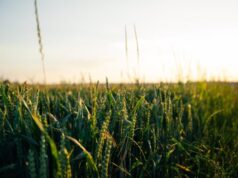The male of the new Amazona is pictured.
Credit: Tony Silva; CC BY 4.0
The newly identified Blue-winged Amazon parrot has a loud, short call and evolved from the White-fronted parrot quite recently, about 120,000 years ago.
In 2014, during a visit to a remote part of the Yucatán Peninsula in Mexico, ornithologist Dr. Miguel A. Gómez Garza came across parrots with a completely different colour pattern from other known species.
A study published today in the open-access journal PeerJ names these birds as a new species based on its distinctive shape, colour pattern, call and behaviour. The paper compares and contrasts the distinguishing features of this species with many other parrots.
The new parrot (Amazona gomezgarzai), referred to as the Blue-winged Amazon because of its primarily blue covert feathers, is characterized by its unique green crown that contrast to blue in other Amazon parrots. This new parrot occupies a similar area in the Yucatán Peninsula as the Yucatán Amazon (A. xantholora) and the White-fronted Amazon (A. albifrons nana) but it does not hybridize with them.
Find your dream job in the space industry. Check our Space Job Board »
A very distinctive feature of the new taxon is its call, which is loud, sharp, short, repetitive and monotonous; one particular vocalization is more reminiscent of an Accipiter than of any known parrot. The duration of syllables is much longer than in other Amazon parrot species. In flight, the call is a loud, short, sharp and repetitive yak-yak-yak. While perched, the call is mellow and prolonged.
This species lives in small flocks of less than 12 individuals. Pairs and their offspring have a tendency to remain together and are discernible in groups. Like all members of the genus Amazona, this parrot is a herbivore. Its diet consists of seeds, fruits, flowers and leaves obtained in the tree canopy.
The analysis of mitochondrial DNA genes indicates that the blue-winged Amazon has emerged quite recently, or about 120,000 years ago, from within the A. albifrons population. During this time, the taxon differentiated sufficiently to be clearly recognizable as a new species.
There is no conservation program currently in effect to preserve this parrot but its small range and rarity should make its conservation a priority.
Story Source:Materials provided by PeerJ. Note: Content may be edited for style and length.
Journal Reference:
Silva et al. A new parrot taxon from the Yucatán Peninsula, Mexico–its position within genus Amazona based on morphology and molecular phylogeny. PeerJ,2017 DOI:10.7717/peerj.3475











